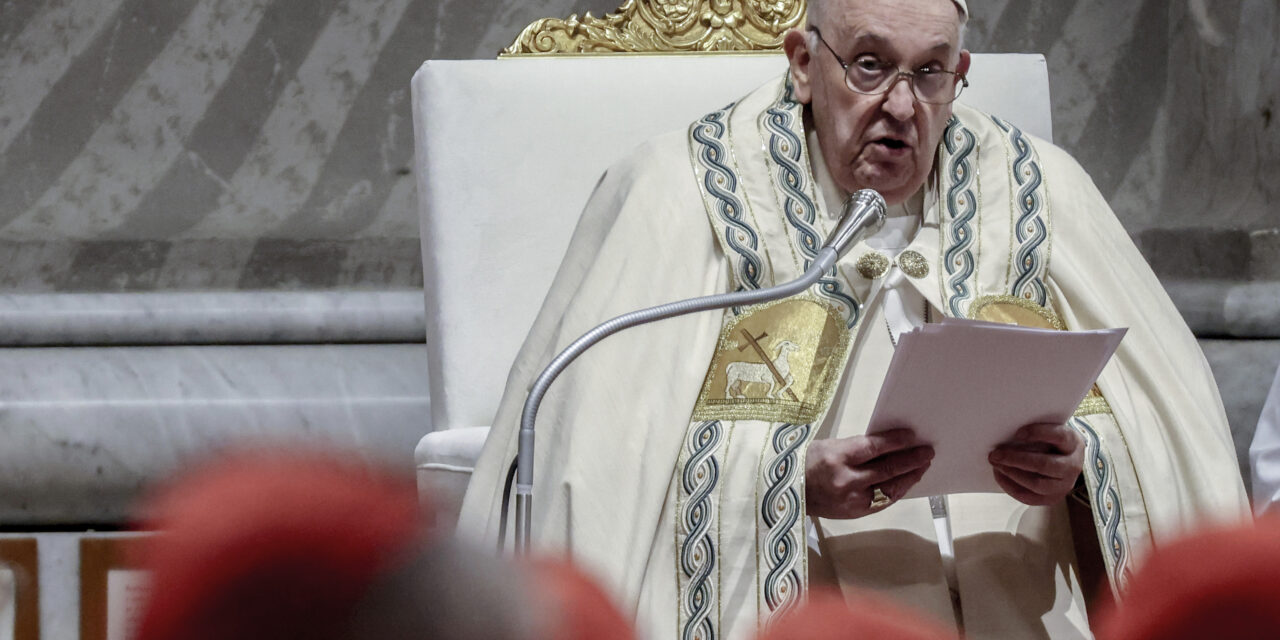This article is the second in a two-part series examining the Vatican’s new document Dignitas Infinita. You can read Part One here.
The Vatican published a document on Monday reflecting on contemporary threats to human dignity. It addresses many of today’s most pressing moral and ethical issues – including modern gender theory, abortion, surrogacy and euthanasia – all of which it rejects in strong terms.
The document Dignitas Infinita (Infinite Dignity) was released on 2 April 2024, the nineteenth anniversary of the death of Pope John Paul II. It was published by the Dicastery for the Doctrine of the Faith (the DDF – the Catholic Church’s top doctrinal office), signed by Víctor Manuel Cardinal Fernández and approved by Pope Francis.
Abortion
The document’s paragraph on abortion reaffirms the Catholic Church’s always-held position that abortion is a grave evil.
The document quotes Pope John Paul II, who compellingly wrote against abortion in Evangelium Vitae (The Gospel of Life). Because of its moral clarity and prophetic nature, it is worth highlighting at length, just as Dignitas Infinita does:
Among all the crimes which can be committed against life, procured abortion has characteristics making it particularly serious and deplorable.
But today, in many people’s consciences, the perception of its gravity has become progressively obscured. The acceptance of abortion in the popular mind, in behavior, and even in law itself is a telling sign of an extremely dangerous crisis of the moral sense, which is becoming more and more incapable of distinguishing between good and evil, even when the fundamental right to life is at stake. Given such a grave situation, we need now more than ever to have the courage to look the truth in the eye and to call things by their proper name, without yielding to convenient compromises or to the temptation of self-deception.
In this regard, the reproach of the Prophet is extremely straightforward: ‘Woe to those who call evil good and good evil, who put darkness for light and light for darkness’ (Is. 5:20).
Especially in the case of abortion, there is a widespread use of ambiguous terminology, such as ‘interruption of pregnancy,’ which tends to hide abortion’s true nature and to attenuate its seriousness in public opinion. Perhaps this linguistic phenomenon is itself a symptom of an uneasiness of conscience. But no word has the power to change the reality of things: procured abortion is the deliberate and direct killing, by whatever means it is carried out, of a human being in the initial phase of his or her existence, extending from conception to birth.
Surrogacy
Dignitas Infinita also speaks strongly against surrogacy – where a woman carries and delivers a child for another couple.
“The Church also takes a stand against the practice of surrogacy, through which the immensely worthy child becomes a mere object,” the document states.
On this point, Pope Francis’s words have a singular clarity: “The path to peace calls for respect for life, for every human life, starting with the life of the unborn child in the mother’s womb, which cannot be suppressed or turned into an object of trafficking. In this regard, I deem deplorable the practice of so-called surrogate motherhood, which represents a grave violation of the dignity of the woman and the child, based on the exploitation of situations of the mother’s material needs. A child is always a gift and never the basis of a commercial contract.
Dignitas Infinita goes on to point out that surrogacy violates the dignity of the child. “Because of this unalienable dignity, the child has the right to have a fully human (and not artificially induced) origin and to receive the gift of a life that manifests both the dignity of the giver and that of the receiver.”
The legitimate desire to have a child cannot be transformed into a “right to a child” that fails to respect the dignity of that child as the recipient of the gift of life.
The document also points out that surrogacy violates the dignity of women. “In this practice, the woman is detached from the child growing in her and becomes a mere means subservient to the arbitrary gain or desire of others,” the DDF states.
Euthanasia
The DDF observes that “there is a widespread notion that euthanasia or assisted suicide is somehow consistent with respect for the dignity of the human person.” This is the case in so called “death with dignity acts.” But this is incorrect, the document states.
It must be strongly reiterated that suffering does not cause the sick to lose their dignity, which is intrinsically and inalienably their own. Instead, suffering can become an opportunity to strengthen the bonds of mutual belonging and gain greater awareness of the precious value of each person to the whole human family.
The DDF said that efforts to alleviate suffering – especially through palliative care for terminally ill patients – are admirable. “However, an effort of this nature is entirely different from – and is indeed contrary to – a decision to end one’s own life or that of another person who is burdened by suffering,” it notes.
Therefore, helping the suicidal person to take his or her own life is an objective offense against the dignity of the person asking for it, even if one would be thereby fulfilling the person’s wish.
The Catholic Church – home to 1.3 billion Christians – plays an outsized role in influencing culture and in persuading the hearts and minds of millions on many vitally important moral and ethical issues.
To be sure, Dignitas Infinita’s clear and courageous opposition to abortion, surrogacy and euthanasia is a very good and praiseworthy development.
Related articles and resources:
Vatican Says ‘Transgender’ Surgeries, Gender Theory Violate Human Dignity
The History of Christianity and Abortion
Perspectives on Surrogate Motherhood






